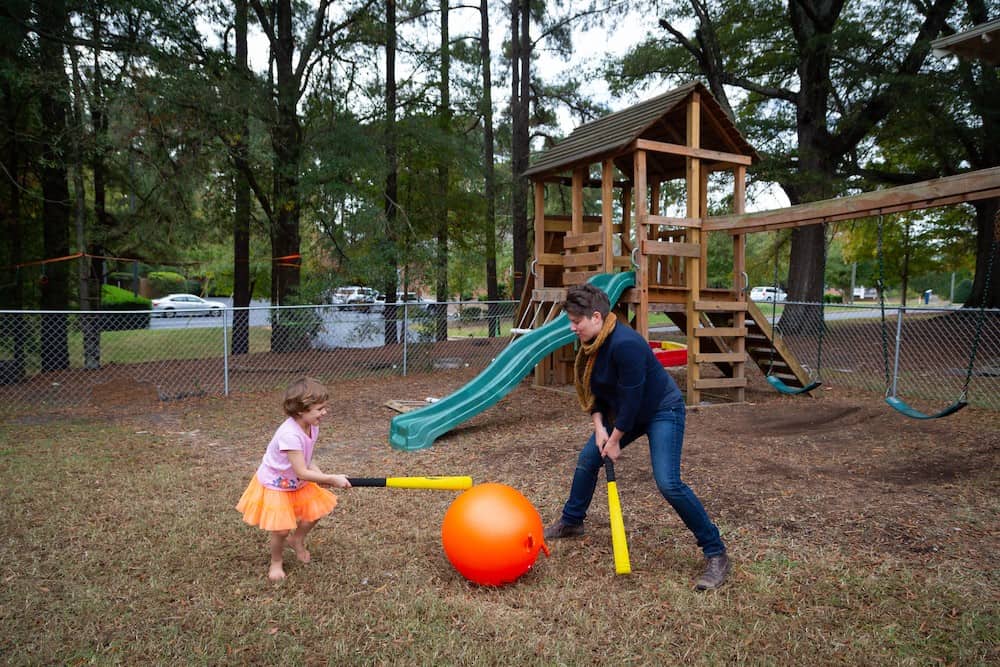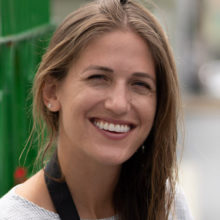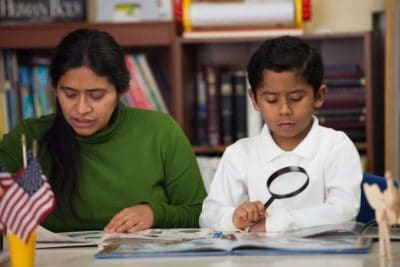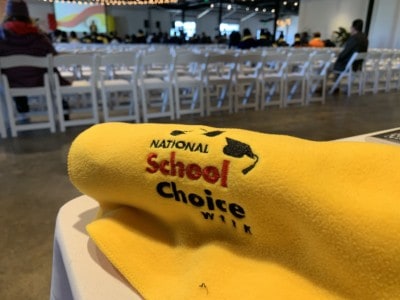

Alice Goldstein’s childhood was filled with theater, swim team, volunteering and “groovy, accepting people.” But, until the 10th grade, Goldstein did not attend a traditional school. Instead, she was “unschooled.” That meant that on a daily basis she decided what, when, where and how she learned and was free to explore her curiosity.
At age nine, Goldstein attended the Durham Schoolhouse of Wonder Unschoolers Day Camp at Eno River Quarry every Monday, where she and 15 other unschoolers spent hours of unstructured time playing in the woods. She always brought a stack of field guides, found at thrift shops, stuffed in her pockets.
The camp ignited a scientific curiosity that would lead Goldstein to study biology at Goucher College in Baltimore, Maryland. Now 24, Goldstein is a toxicologist in cellular biology at the Environmental Protection Agency (EPA).
“The big difference in my school experiences is that I chose to be there,” Goldstein said. “Unschooling taught me how to set goals, be adaptable, and learn how to achieve them from an early age.”
John Holt, an American author and educator who pioneered youth rights theory, coined the term unschooling in the 1970s. He defined it as “taking children out of school.” Today, it is an educational approach focused on self-directed learning tied to a child’s interests. It prioritizes community immersion, asking parents to forget the books, desks, tests and even the teacher. Instead, children have the freedom to choose what they learn and follow their curiosities.
It is different from homeschooling in that there are no structured tests or assignments. And, the parent does not fill the role of a teacher.
This form of homeschooling is legal in all 50 states, but many have different policies on how to report learning outcomes. North Carolina is known for its favorable education choice policies including an Education Savings Account and two voucher programs that assist families with funding.
This could be one of the reasons why the state’s growth in homeschooling outpaces the national trend.
According to the CATO institute, federal surveys show national rates of homeschoolers holding steady or slightly declining, whereas North Carolina’s homeschool population grew by 27% between 2014 and 2018. The North Carolina Homeschool Statistical Summary found that there were 90,688 homeschoolers in 2019.
The Unschoolers of North Carolina Facebook group has 1,181 members. Some parents are currently unschooling and looking for a community while others join who are considering unschooling their children and seeking resources or guidance.
The Facebook page shares a variety of reasons parents opt out of the public school system. But, in the National Center for Education Statistics’ 2016 National Household Education Survey it was found that dissatisfaction with public schools is the number one reason parents cited for leaving the public school system.
For Katherine Williams, 53, choosing to unschool her two children was “the best decision she ever made,” although, at first, she was terrified.
After learning that the nearby public elementary school would not accommodate her son’s advanced reading level in class, Williams decided to homeschool. Then, she discovered unschooling.
Williams said she “deschooled” herself in order to fully embrace the concept of unschooling. Deschooling was the process of completely stepping out of the system that told her how to learn to think in her own institutionalized education.
“It seems really silly looking back. It’s so easy – all aspects of my children’s lives were teachable moments,” Williams said.
She is now a passionate advocate of unschooling and enjoys having conversations with other curious and brave parents who are thinking about leaving traditional school environments.
“I see the public school system as an ineffective tool for growing happy humans,” Williams said. “It imprisons them — from the command and obey environment, age-segregated classrooms, few teachers, to the disconnection from the larger world.”
Both of her children are now in college. Henry, 21, studies philosophy at the University of North Carolina at Chapel Hill, and Riley, 19, is a first-year student at Durham Tech. Williams credits unschooling for their curious and ambitious minds and “could not be prouder of their accomplishments.”
Unschoolers are able to attend college by completing SAT prep training or attending North Carolina’s free homeschool community college program. There are also services, like North Carolinians for Home Education, that help children translate their unschooling experiences into a transcript.
However, it’s no secret that successful unschooling might require a parent at home or some economic means to attend various community events and activities. Responding to economic disadvantages some families might face, both Williams and Goldstein said that the Triangle unschooling community is “incredibly diverse.”
“The wealthy-only concept is a huge myth because unschooling is a lot of sacrifice. I know other families who live at a lower income, farm, work night shifts, or have lost everything and still choose to unschool,” Williams said.
The philosophy of unschooling and the question of its accessibility inspired Hope Wilder, 35, to found Durham Pathfinder School, a self-directed learning community.
Pathfinder has 24 students from ages 4 to 15. Wilder said parents and students come to Pathfinder seeking a more individualized and less restrictive learning experience. But, they still want community learning with other kids.
“We are pretty radical compared to some unschoolers,” Wilder said. “We don’t force kids to learn anything they don’t ask for. If they ask for lectures and teaching, then we do that.”
She calls this consent-based education.
On a recent day at Pathfinder, the focus of attention was board games such as Dungeons and Dragons. Children were also drawing or sewing, while others were outside playing a game they invented called “Goat Ball” or tending to the vegetable garden.
Wilder taught Goldstein at the Schoolhouse of Wonder 15 years ago, and remembers the field guides she brought to camp.
“I never want to teach a child something they don’t want to learn again,” she said. “The most important skill for children is learning how to learn and never losing their curiosity.”



